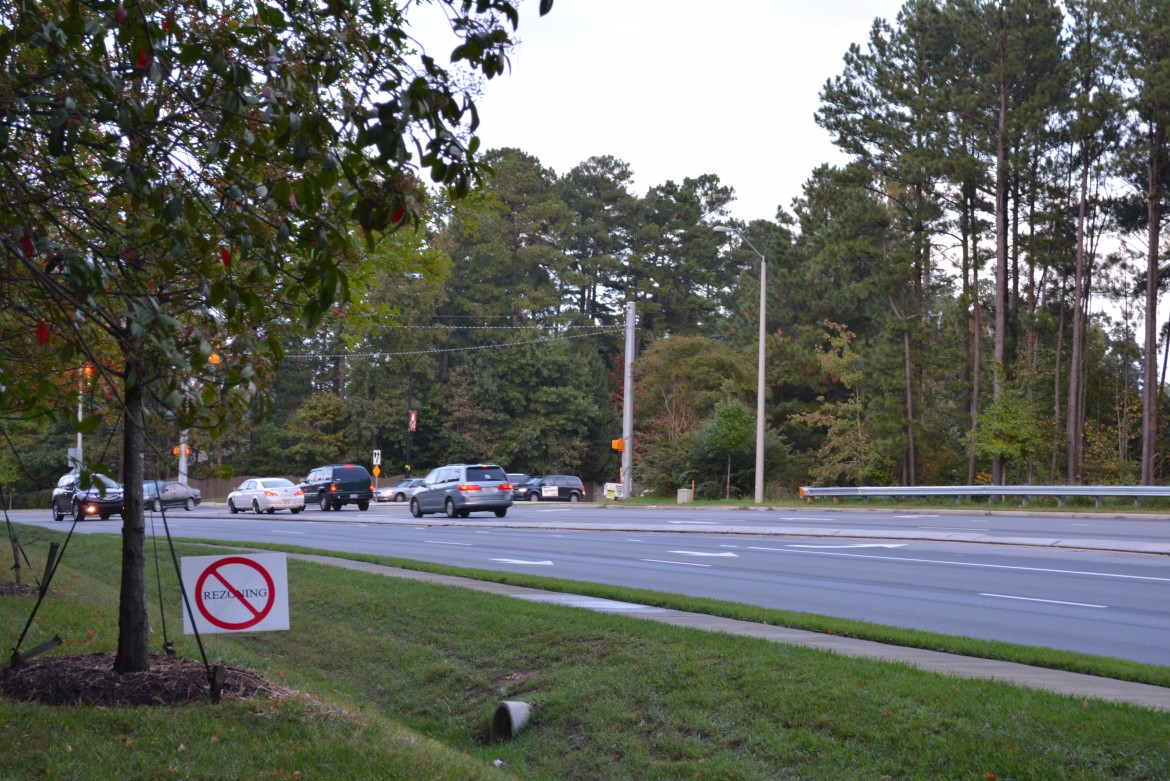In an attempt to prevent increased density on a piece of land in their neighborhood, 45 North Raleigh homeowners have filed a valid statutory protest petition against zoning case Z-27-14, better known as the citywide remapping case.
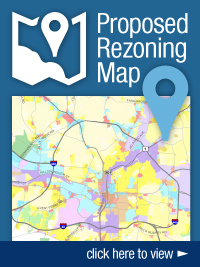 The remapping case will affect around 30 percent of the city and update the classification for around 35,000 parcels of land in accordance with the new zoning districts laid out in the city’s Unified Development Ordinance.
The remapping case will affect around 30 percent of the city and update the classification for around 35,000 parcels of land in accordance with the new zoning districts laid out in the city’s Unified Development Ordinance.
The protest petition could make it more difficult for the remapping to be approved as-is by city council.
A protest petition, under current North Carolina law — state lawmakers will likely do away with them altogether upon their return from vacation July 13 — requires a three-fourths majority vote of approval from city council for any rezoning case against which a petition has been filed.
Of the eight members of Raleigh’s governing body, which includes the mayor and city councilors, six will have to vote in favor of the remapping-rezoning case in order for it to move forward.
David Cox, from the North Raleigh Coalition of Homeowners, spoke to the Record on Monday about the petition they filed against the remapping.
He said neighbors were concerned about the possibility of an increased allowable density on two properties in their neighborhood, which would lead to greater traffic, more noise and additional light pollution.
The properties in question are located at the intersection of Dunn and Falls of Neuse Road in North Raleigh.
Round Two
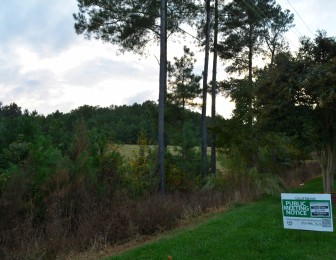
James Borden / Raleigh Public Record
The controversial site off Falls of Neuse
This isn’t the first time Cox and his neighbors have fought against redevelopment plans on that land, which currently sits undeveloped.
A rezoning case filed in early 2014, Z-1-14, would have allowed developers to rezone the property to allow for a high-intensity grocery-anchored shopping center. Cox and his neighbors felt the development would be detrimental to the surrounding area, and ultimately a total of four VSPPs were filed against the case.
City council voted against the rezoning 8-0 in May, and the developers withdrew their application.
Under the citywide remapping plan, the parcel at Dunn and Falls would be rezoned in such a way as to allow for higher retail intensity.
A portion of the land in question is currently zoned buffer commercial, conditional use. Under the existing zoning code, buffer commercial allows for a maximum floor area for a retail development of 3,000 square feet. The remapping case would change the zoning on this property to neighborhood mixed use with conditions, which would allow for a much greater-intensity retail use.
It should be noted that the conditions on this property are the result of a rezoning case from 1994, Z-55-94. Properties reclassified under the remapping will not overrule existing conditions placed on a property. On the Dunn and Falls parcel, for example, a number of uses, including utility substations, penal facilities and group homes, are prohibited.
The Dunn and Falls parcel is also located in a watershed protection area, and the corridor on which the two properties sit goes through the Fall Lake Dam. Cox said allowing density on the scale of a grocery store would not be appropriate for the watershed, and would set a bad precedent.
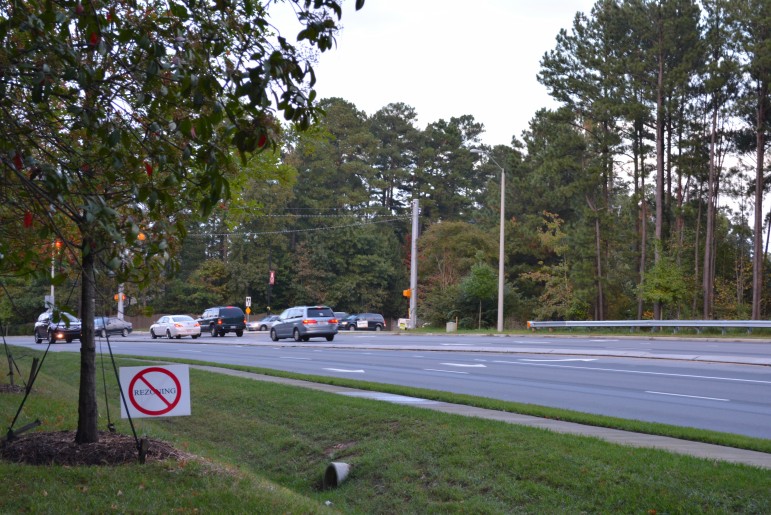
James Borden / Raleigh Public Record
Signs protesting Z-1-14 were placed along Falls of Neuse Road
He also believes that the increased density on the land would be out-of-character with the surrounding area.
“We’re trying to preserve the nature of our neighborhoods,” Cox said.
Citywide Remapping to include 41,000 acres of property
The citywide remapping affects around 41,000 acres of property within the city and will phase out old zoning codes into predominantly mixed use districts.
A public hearing to receive citizen input on the citywide remapping will take place tonight, July 7 at 7 p.m.
The city is preparing for a public turnout on the case beyond the capacity of council chambers. An overflow viewing area will be set up in the lobby of city hall, with the hearing broadcast from televisions. The hearing is scheduled to last until 10 p.m., and is unlikely to end with a final vote by council.
Steven Schuster, chairman of the city’s planning commission, said the citywide remapping is a response to the call for increased density within the city, which started with the adoption of the 2030 Comprehensive Plan. With the adoption of that document, the old urban sprawl approach was eliminated. Instead of building “out,” Raleigh would be built “up.”
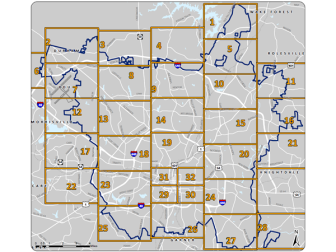 The citywide remapping item — Z-27-14 — took six months to complete and the planning commission heard more than 40 hours of testimony, Schuster said. It is designed to provide a framework in which Raleigh can handle the large population growth that is expected in the future.
The citywide remapping item — Z-27-14 — took six months to complete and the planning commission heard more than 40 hours of testimony, Schuster said. It is designed to provide a framework in which Raleigh can handle the large population growth that is expected in the future.
Frequent complaints heard in the planning commission surrounding cases that call for increased development are increased traffic, more noise, and increased light pollution.
Many cases are submitted with conditions that try to mitigate these impacts, although they can still be denied approval by council should enough citizens make their voices heard in opposition.
Cox said that greater density isn’t a bad thing, so long as it occurred in growth areas, rather than everywhere throughout the city.
Following a plan, he said, was a good thing rather than “opening up the floodgates and letting it become the wild, wild west.”
“In general, I think increased density is a good thing,” Cox said.
